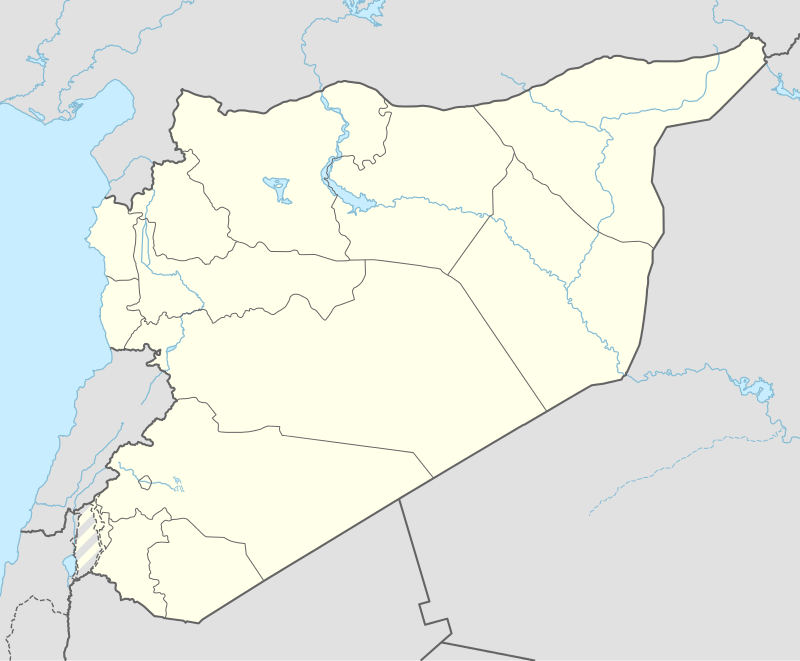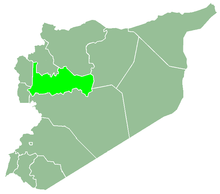Al-Rusafa, Syria
| Al-Rusafa الرصافة Rassafah, Rosafah, Resafi | |
|---|---|
| Village | |
 Al-Rusafa Location in Syria | |
| Coordinates: 35°1′59″N 36°18′9″E / 35.03306°N 36.30250°ECoordinates: 35°1′59″N 36°18′9″E / 35.03306°N 36.30250°E | |
| Country |
|
| Governorate | Hama |
| District | Masyaf |
| Subdistrict | Masyaf |
| Population (2004) | |
| • Total | 1,608 |
| Time zone | UTC+2 (EET) |
| • Summer (DST) | UTC+3 (EEST) |
| City Qrya Pcode | C3360 |
Al-Rusafa (Arabic: الرصافة Ruṣāfa, also spelled Rassafah, Rosafah or Resafi) is a Syrian village located in the Masyaf Subdistrict in Masyaf District, located west of Hama and about 10 kilometers southwest of Masyaf.[1] According to the Syria Central Bureau of Statistics (CBS), al-Rusafa had a population of 1,608 in the 2004 census.[2] Its inhabitants are predominantly Alawites.[3] It is the site of a former Ismaili fortress.
Fortress
At the northern edge of the village is the fortress of al-Rusafa, which is situated on a hill 60 meters higher than the village itself. The fortress is largely preserved, although it is mostly covered by trees and vegetation. In the medieval period, it acted as a subsidiary fortress for the main Ismaili fortress of Masyaf. At its largest extent, it measures roughly 75 meters by 30 meters and is oval-shaped. The fortress was constructed from stone from local quarries and it consists of three stories.[1]
The entrance in the northwestern section of the fortress is guarded by a tower. The outer walls are dominated by galleries and chambers, which presumably played the role of battlements. The lowest floor contains several storage rooms, a number of which were built 20 meters deep into the ground. The middle area of al-Rusafa is marked by the extensive presence of vaulted rooms. Although ruined, the central towers "are still high" according to Peter Willey,[1] an authority on Ismaili castles.[4]
History
Al-Rusafa was taken over by the Nizari Ismailis around 1140 CE along with other fortresses in the vicinity, namely Masyaf, Khawabi, al-Maniqa and Qulay'a.[5] The fortress was rebuilt by the Ismaili da'i (chief) Rashid ad-Din Sinan in the 1160s.[6] It is possible that another fortress stood in its place prior to the Ismaili conquest.[1] In May 1271, the Bahri Mamluk sultan Baibars besieged and captured al-Rusafa from the Ismailis.[7]
In the mid-1960s, al-Rusafa was a small village that contained an old khan (caravanserai) in addition to its partially ruined fortress.[8]
Gallery
References
- 1 2 3 4 Willey, 2005, p. 228.
- ↑ "General Census of Population 2004". Retrieved 2014-07-10.
- ↑ Honigman, p. 791.
- ↑ Peter Willey Archived 2013-06-21 at the Wayback Machine.. The Institute of Ismaili Studies.
- ↑ Willey, 2005, p. 44.
- ↑ Willey, 2005, p. 46.
- ↑ Daftary, 2007, p. 433.
- ↑ Boulanger, 1966, p. 349.
Bibliography
- Boulanger, Robert (1966), Moyen-Orient: Liban, Syrie, Jordanie, Iraq, Iran (in French), Hachette
- Daftary, Farid (2007), The Isma'ilis: Their History and Doctrines, Cambridge University Press, ISBN 9781139465786
- Willey, Peter (2005), The Eagle's Nest: Ismaili Castles in Iran and Syria, I.B.Tauris, ISBN 9781850434641





